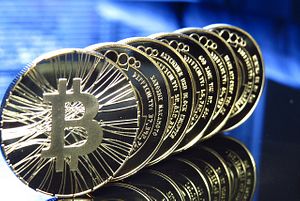Despite its name, shorthand for the popular tagline “You Only Live Once,” Yolo Cafe in Hanoi’s Ba Dinh District has the laid-back vibe typical of cafés in Vietnam’s capital. Young Vietnamese customers lounge on vintage couches and sip smoothies, chatting or toying with their smartphones. But in February, owner Hung Xu had an idea to set the café apart.
Inspired by friends who “mined” Bitcoin as a hobby, he posted a sign telling customers they could pay using the virtual currency. As a marketing strategy, it was immediately effective.
“People came every day to ask about Bitcoin. I was busy with interviews all the time,” Hung told me.
But the payment system was never used. After Yolo enjoyed a few weeks of publicity, the police questioned Hung. In April, he removed the sign.
“Vietnam’s Bitcoin community is still small and fragmented,” said Ho Chi Minh City-based Coin Telegraph reporter Diana Ngo. “There are miners, traders, and enthusiasts, but most of them choose to keep it quiet.”
Hong Kong’s Bitcoin Association consists of 600 members; Hanoi’s more informal group of Bitcoin adopters numbers roughly five. In Ho Chi Minh City, the country’s economic hub, Ngo said most people had “only heard about Bitcoin,” although many were “really curious.” CoinMap lists only two Vietnamese businesses that accept Bitcoin. On BitLegal, which sorts countries by their friendliness towards Bitcoin, Vietnam joins Iceland as one of only two nations marked as “hostile” to the virtual currency.
But the country’s fledgling Bitcoin entrepreneurs remain undaunted. Bitcoin Vietnam recently launched the country’s first live exchange, where people can trade the virtual currency in real time; co-founder Dominik Weil said this was “the first step” towards building Vietnam’s “crypto-economy.” While state bank official Bui Quang Tien warned that the exchange would be shut down, no action was taken and Weil dismissed the threat: “It’s not that serious. We are not in jail.”
Vedran Kajic, who helped found Bspend in his native Croatia, was surprised by the potential he saw in Vietnam during a recent visit.
“Looking at BitLegal, I thought the situation was really bad, like the government would prosecute you,” he said. “But when I talked to those guys, it didn’t seem so bad.”
“Those guys” refers to Hanoi entrepreneurs Lê Xuân Thảo and Bui Huy Kien, who constitute roughly half of the city’s Bitcoin fan club. Thao heads a startup called T-Zone, which built a multi-purpose ATM where customers can fill their Bitcoin “wallets” in addition to topping off mobile phone credit and online gaming accounts. Kien runs an online forum called Lamchame (“Parenting”) that allows advertisers to pay with Bitcoin. So far only one has done so, a price comparison website called Websosanh. But Kien remains optimistic about the virtual currency’s potential.
“Bitcoin is the future of Internet payment,” he told me. “Young people buy things on the Internet a lot. But only a small number of Vietnamese people use credit cards. They’re not secure enough.”
































